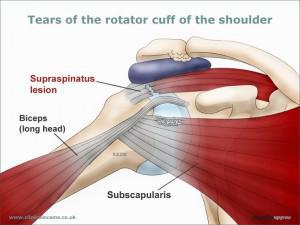
A Supraspinatus tear is a common area of injury in the rotator cuff complex. These are a group of muscles surrounding the humerus that help to keep the shoulder(humerous) in place. They are the supraspinatus, infraspinatus, subscapularis, and teres minor muscles. These muscles facilitate movement of the shoulder joint in different directions, ie. raising your arm overhead. Other supportive structures which help to stabilise the shoulder include the shoulder capsule and the ligaments of the shoulder. See video.
Supraspinatus Tear – Acute vs Degenerative
Acute tears to the rotator cuff muscles/tendons often occur due to sports or impact injuries. can occur alongside injuries like shoulder dislocation, clavicle fractures, or other rotator cuff injuries that can happen as the result of things like a fall on your outstretched arm or attempting to lift something too heavy; plus there are a variety of sports where the athletes are prone to shoulder damage like baseball, basketball, rugby, AFL Football, and tennis. Construction work and other high-risk physical jobs can also increase the likelihood of experiencing this type of injury.
Alternatively degenerative type tears can occur due to overuse and as a result of age and lifestyle. Instead of a single catastrophic episode or trauma to the shoulder, these tears are the result of damage and wear on the supraspinatus structure slowly over time. The likeliness of these issues increases with age and is more common in the dominant hand. In addition, if you experience a degenerative tear in one shoulder, you’re at a greater risk for a tear in the other shoulder. Men over forty are the most likely to have degenerative supraspinatus tears. Factors like smoking, hypercholesterolemia, weight and BMI, height, bone spurs, and other genetic factors increase the chances as well.
A Supraspinatus tendon tear can be full thickness (the entire muscle is affected) or partial thickness (incomplete tear). Tears can be symptomatic , where there is pain and your ability to perform basic everyday tasks is greatly reduced, or it can be asymptomatic, meaning that the tear causes very slight or no pain.
Difference between full and partial thickness Supraspinatus tear
You can partially or fully tear your supraspinatus muscle, and remember that these sorts of tears can be symptomatic (meaning they cause supraspinatus pain and inhibit your range of motion and ability to perform everyday tasks) or asymptomatic, meaning the tear is present but it not currently causing you pain or otherwise causing problems in your life. Partial thickness tears of the supraspinatus muscle are an incomplete disruption of muscle fibers.
If you have been diagnosed with a partial thickness tear and begin experiencing more pain you should talk to your orthopaedic surgeon. Sometimes partial tears can progress to full thickness tears. Full thickness tears can also occur spontaneously and are the complete disruption of the fibers of the supraspinatus muscle.
The supraspinatus tendon can also be the site of injury. Tendons have poor blood supply and will not heal themselves. The longer these tears are left untreated, the more chance the tendon tear will enlarge and retract which results in more difficult surgery to repair this damage.
Diagnosis of a Supraspinatus tear
Various orthopedic tests can help indicate the likelihood of a supraspinatus tear during a physical exam. Magnetic resonance imaging (MRIs), and ultrasound scans are all used to confirm diagnosis.
Treatment
Depending on the severity of the tear, a surgeon may recommend starting with a non-surgical treatment like physiotherapy. For most tears this is rarely effective. Cortisone injections can give short term relief but cause more harm long term. They can be effective if the main cause of pain is a sub-acromium bursitis
For full thickness tears and more major tears there is significant damage to the tendon, various surgical procedures such as arthroscopic shoulder surgery are usually required. Full thickness tears will not heal without surgery. I have however seen cases where the supraspinatus muscle shrivels up after a full tear and basically withers away. In some such cases there is little or no pain at that stage and other muscles take over to a certain extent during shoulder movement, allowing the person to carry out normal daily activities.
To discuss your condition, make an appointment or get a second opinion please contact us.